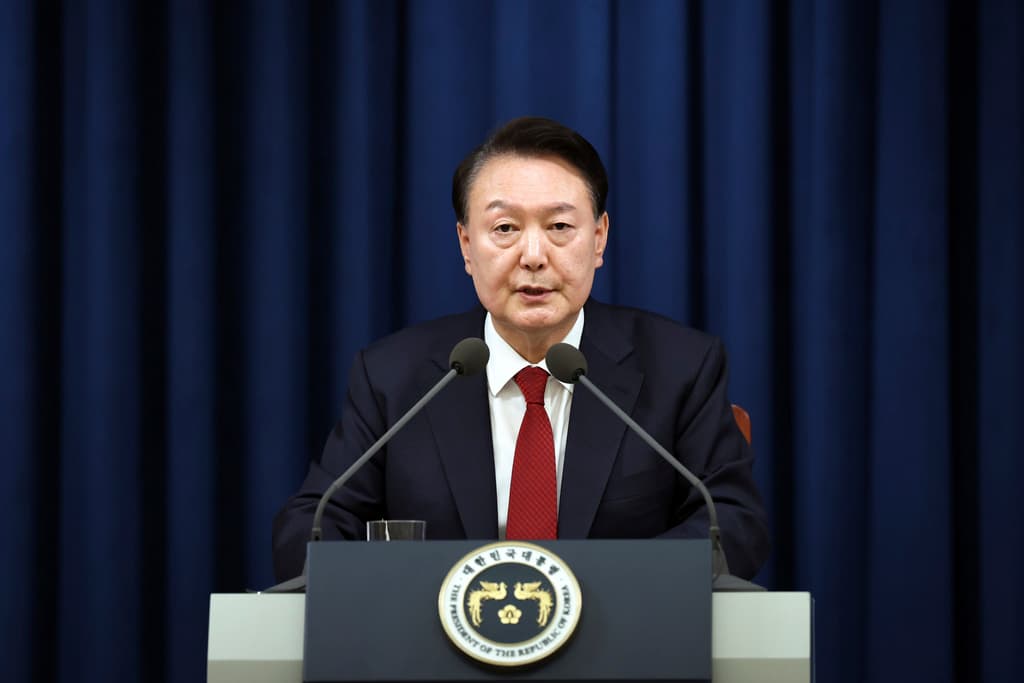Shackles Tighten on South Korean President as Government Scrambles To Keep Wheels of Power Turning Amid Crisis
Yoon Suk-yeol is forbidden to leave the country while the justice ministry investigates whether his martial law decree was an act of ‘treason.’

South Korea’s president, Yoon Suk-yeol, isn’t going anywhere. The justice ministry, which would normally be under his control, has forbidden him to leave the country while the ministry and the police corruption cops investigate whether his martial law decree was an act of “treason.”
The ban on travel for Mr. Yoon underlines the metaphorical shackles imposed on the president not only by government agencies but also by the top leaders of his own “ruling” People Power Party. Not to mention the powerful leftist-led opposition, the Minju, or Democratic Party.
The ban may appear meaningless while Mr. Yoon fights the charges as well as unending attempts by the Minju to overthrow him, but it’s humiliating for a president who in two and a half years made 21 trips overseas. His most recent was last month, to the G20 summit at Rio de Janeiro. President Biden in April 2023 hosted him at the White House, having him sing “American Pie.”
In August Mr. Yoon was at Camp David for the trilateral summit with Japan’s prime minister at the time, Fumio Kishida.
Thousands of people have gathered around the national assembly in anticipation of another attempt to impeach Mr. Yoon. Government agencies scrambled to keep the wheels of power rolling in a semblance of normalcy despite the absence of a clear leader.
The finance minister, Choi Sang-mok, urged the assembly, where Mr. Yoon’s foes hold a wide majority, to pass the budget “to ensure external credibility and economic stability,” Seoul’s Yonhap News reported. It was the opposition demanding a much smaller budget and then attempting to “impeach” Mr. Yoon’s appointed budget director and other top officials that led him to try his abortive attempt to have his way via martial law.
Adding to the confusion, a defense ministry representative said the president “legally” remains “commander-in-chief” and in control of the armed forces. Although North Korea’s leader, Kim Jong-un, has yet to show signs of attempting to exploit the turmoil, the spokesman said it would be up to Mr. Yoon to order a military response in the event of war.
Yet the acting defense minister, Kim Seon-ho, said the armed forces would not fall in line again behind Mr. Yoon if he were to issue another martial law decree. Mr. Yoon’s defense minister, Kim Yong-hyun, having lost his job, has been arrested for recommending the martial law decree and then ordering troops to surround the national assembly in an attempt to block legislators from voting against martial law.
While Mr. Yoon resists demands to resign, one of his most serious foes appears to be the leader of his party, Han Dong-hoon. He has said that the president has no control over any of the branches of government and that his days in office are numbered.
Han Song-hoon and the prime minister, Han Duck-soo, a former ambassador to Washington, agree on the need to get Mr. Yoon to resign. If he were to step down, Han Duck-soo would serve as acting president for two months pending an election in which Han Song-hoon might well be the People Power Party candidate against the leader of the Democratic Party, Lee Jae-myun.

